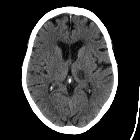Schlaganfall





Apoplexy is a term that has been part of medical terminology since antiquity and now means a sudden and catastrophic clinical presentation restricted to a few intracranial events, namely pituitary apoplexy and the far less common pineal apoplexy. Importantly, it remains a term that denotes a clinical presentation rather than merely the presence of hemorrhage into a pituitary and pineal lesion.
History and etymology
The term apoplexy comes from the greek apoplexia meaning “struck down with violence” or “to strike suddenly” . As such, it was used to encompass a wide variety of clinical events that manifested suddenly, such as strokes and subarachnoid hemorrhage but also any systemic event that resulted in similar sudden and dramatic clinical presentation .
It was only from the 17th century onwards that the term apoplexy began to be restricted to intracranial vascular causes encompassing both hemorrhagic and ischemic events . Only in the 5th revision of the International List of Causes of Death (ILCD-5) was the term dropped for what we would now call strokes .
Siehe auch:
- Intrazerebrale Blutung
- Subarachnoidalblutung
- Ischämischer Schlaganfall
- diffusion weighted MRI in acute stroke
- Lobärblutung
- intrakranielle Thrombektomie
- kongenitale vaskuläre Malformationen
- Kopfschmerzen mit neurologischen Defiziten und Liquorlymphozytose (HaNDL)
- hypertensive haemorrhage
- brain tumour
und weiter:

 Assoziationen und Differentialdiagnosen zu Apoplex:
Assoziationen und Differentialdiagnosen zu Apoplex:







